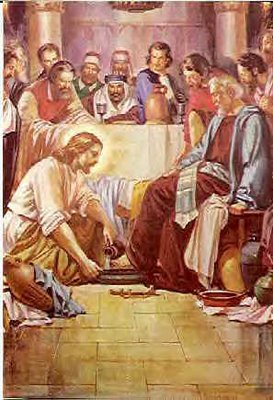
Faithful Christians look to certain acts with great importance. These sacraments are seen as special ways in which the saving grace and the presence of God come to us in material things, something you can taste, see, touch or hear (like bread, wine, or baptismal water) There has to be a Scriptural command to do it and a Scriptural promise from God that comes with doing it in faith. Putting that grace and presence into the stuff of earth and daily experience gives us a way to connect with or link to it. Without a contact point, we lose touch with the spirit-ness of it. We could more easily pretend that we don't know where Christ is.
'Sacrament' is a Roman Christian term, but the idea behind it is no stranger to the Jewish Scriptures. Whether it be circumcision for Abraham and his descendents, or when Jews recount the Passover through a meal, there is something that can be touched, felt, tasted, or seen, something reenacted, with a promise of something special from God that went with it. God's promises don't just dangle there, floating above our lives beyond our reach. They show themselves through earthly things.
Sacraments are not about the ritual ceremony itself. The power and new life are in the promise of Jesus' presence. The miracle starts in that promise, not in the bread or wine or priest or blessing or ceremony. Sacraments work not because they are done, but because the promise is believed. You come to do it because you trust God and God's promises, due to the Spirit's work in you to grow that trust. Of course, over the course of 2000 years, the churches have done some odd things to this sacrament.
The Christian way of viewing the faith and the world is 'incarnational' (God's purpose is done through earthly stuff, such as a Jewish nation or a person Jesus) and 'sacramental' (God's saving work, as promised, is borne through earthly stuff, such as Jesus Himself, and what He said would bear His presence).
Where there is no faith, it's not that holy communion doesn't do its thing, but that the person didn't receive it right. If someone takes a gift and throws it in the trash bin, they get no gain from what was given, no matter how good or effective it is.
COMING TOGETHER
The name 'Communion' comes from it being something done with others. It's done with Christ. It's done with other believers. In sharing the meal, 'I' becomes 'us'. The same stuff, physical and spiritual, food and Christ, goes into each of those who are there.
The unity found in holy communion has many facets, like a well-cut jewel. But the key one is that if each of us is united in Christ, then each of us is united with each other.
Communion links us to the future, not only by making us one in Christ with future believers, but by our trusting in the Lord of the Last Days, the One who's in charge when time itself ends. Or, to put it as an ancient creed puts it, "we look for the resurrection of the dead / and the life of the world to come".
No comments:
Post a Comment